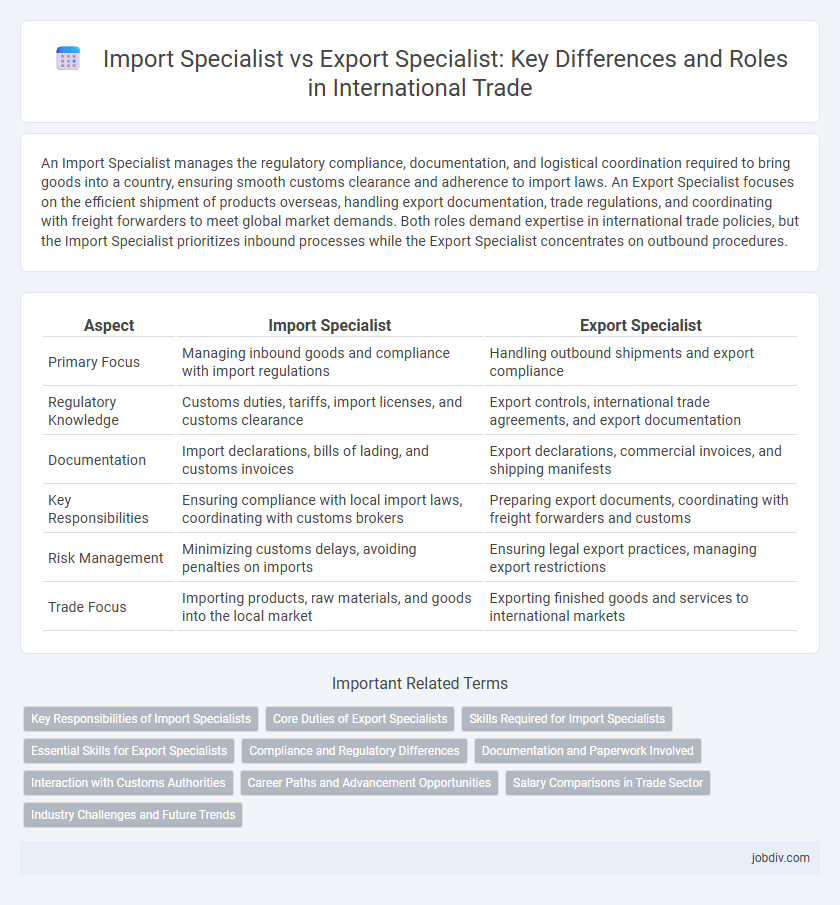An Import Specialist manages the regulatory compliance, documentation, and logistical coordination required to bring goods into a country, ensuring smooth customs clearance and adherence to import laws. An Export Specialist focuses on the efficient shipment of products overseas, handling export documentation, trade regulations, and coordinating with freight forwarders to meet global market demands. Both roles demand expertise in international trade policies, but the Import Specialist prioritizes inbound processes while the Export Specialist concentrates on outbound procedures.
Table of Comparison
| Aspect | Import Specialist | Export Specialist |
|---|---|---|
| Primary Focus | Managing inbound goods and compliance with import regulations | Handling outbound shipments and export compliance |
| Regulatory Knowledge | Customs duties, tariffs, import licenses, and customs clearance | Export controls, international trade agreements, and export documentation |
| Documentation | Import declarations, bills of lading, and customs invoices | Export declarations, commercial invoices, and shipping manifests |
| Key Responsibilities | Ensuring compliance with local import laws, coordinating with customs brokers | Preparing export documents, coordinating with freight forwarders and customs |
| Risk Management | Minimizing customs delays, avoiding penalties on imports | Ensuring legal export practices, managing export restrictions |
| Trade Focus | Importing products, raw materials, and goods into the local market | Exporting finished goods and services to international markets |
Key Responsibilities of Import Specialists
Import Specialists are primarily responsible for managing the receipt and processing of incoming shipments, ensuring compliance with international trade regulations, tariffs, and customs documentation. They coordinate with customs brokers, freight forwarders, and government agencies to facilitate timely clearance and prevent delays or penalties. Their role includes auditing import records, monitoring delivery schedules, and resolving discrepancies related to shipment contents or valuation.
Core Duties of Export Specialists
Export specialists manage the documentation, compliance, and regulations required for shipping goods internationally, ensuring shipments meet customs and trade laws. They coordinate with freight forwarders, customs brokers, and international clients to facilitate smooth export processes and timely delivery. Their core duties include preparing export declarations, verifying product classification under export control lists, and monitoring export licensing requirements.
Skills Required for Import Specialists
Import Specialists require in-depth knowledge of customs regulations, international trade compliance, and tariff classification to ensure smooth import processes. Proficiency in documentation accuracy, supply chain coordination, and risk management is essential for mitigating delays and avoiding penalties. Strong analytical abilities and communication skills enable Import Specialists to navigate complex import laws and collaborate with freight forwarders and customs authorities efficiently.
Essential Skills for Export Specialists
Export specialists require strong knowledge of international trade regulations, customs compliance, and documentation processes to ensure smooth shipment of goods across borders. Proficiency in market research and negotiation skills is crucial for identifying global opportunities and securing favorable terms with overseas buyers. Effective communication and problem-solving abilities enable export specialists to coordinate logistics, manage risks, and resolve challenges during the export process.
Compliance and Regulatory Differences
Import Specialists focus on ensuring shipments comply with local customs regulations, tariffs, and import licenses, managing documentation such as bills of lading and customs declarations to avoid delays and penalties. Export Specialists navigate international trade laws, export controls, and sanctions, ensuring compliance with export licenses, product classifications, and destination country regulations. Both roles require expertise in trade compliance, but Import Specialists prioritize inbound shipment regulations while Export Specialists concentrate on outbound shipment controls and international export requirements.
Documentation and Paperwork Involved
Import specialists handle documents such as customs declarations, import licenses, and bills of lading to ensure compliance with local regulations and tariffs. Export specialists focus on preparing commercial invoices, export licenses, and certificates of origin to meet international trade requirements and facilitate smooth shipments. Both roles require meticulous attention to documentation accuracy to avoid delays, penalties, or shipment rejections in global trade operations.
Interaction with Customs Authorities
Import Specialists streamline the clearance of goods by ensuring all documentation complies with customs regulations, minimizing delays and penalties during the import process. Export Specialists coordinate with customs to secure proper export licenses and verify that shipments meet destination country requirements, facilitating smooth cross-border trade. Both roles require deep knowledge of tariff classifications, customs compliance, and international trade laws to optimize supply chain efficiency.
Career Paths and Advancement Opportunities
Import Specialists concentrate on managing compliance, customs regulations, and documentation to ensure smooth inbound shipments, offering career growth through roles like Customs Compliance Manager or Trade Operations Director. Export Specialists focus on facilitating outbound shipments, handling export controls, and coordinating logistics, leading to advancement opportunities such as Export Compliance Manager or International Trade Coordinator. Both paths require deep knowledge of trade laws and evolving global markets, with specialization often driving career progression in multinational companies.
Salary Comparisons in Trade Sector
Import Specialists in the trade sector typically earn salaries ranging from $50,000 to $75,000 annually, influenced by experience and geographic location. Export Specialists often command slightly higher pay, with average salaries between $55,000 and $80,000 due to the complexities of international markets and compliance regulations. Both roles offer opportunities for bonuses and salary growth tied to trade volume and company performance.
Industry Challenges and Future Trends
Import specialists face challenges such as navigating complex customs regulations, managing supply chain disruptions, and ensuring compliance with international trade laws. Export specialists must address market entry barriers, fluctuating foreign exchange rates, and adapting to diverse regulatory environments. Future trends include the integration of AI for trade analytics, increased emphasis on sustainability in supply chains, and the rise of digital trade platforms streamlining cross-border transactions.
Import Specialist vs Export Specialist Infographic

 jobdiv.com
jobdiv.com